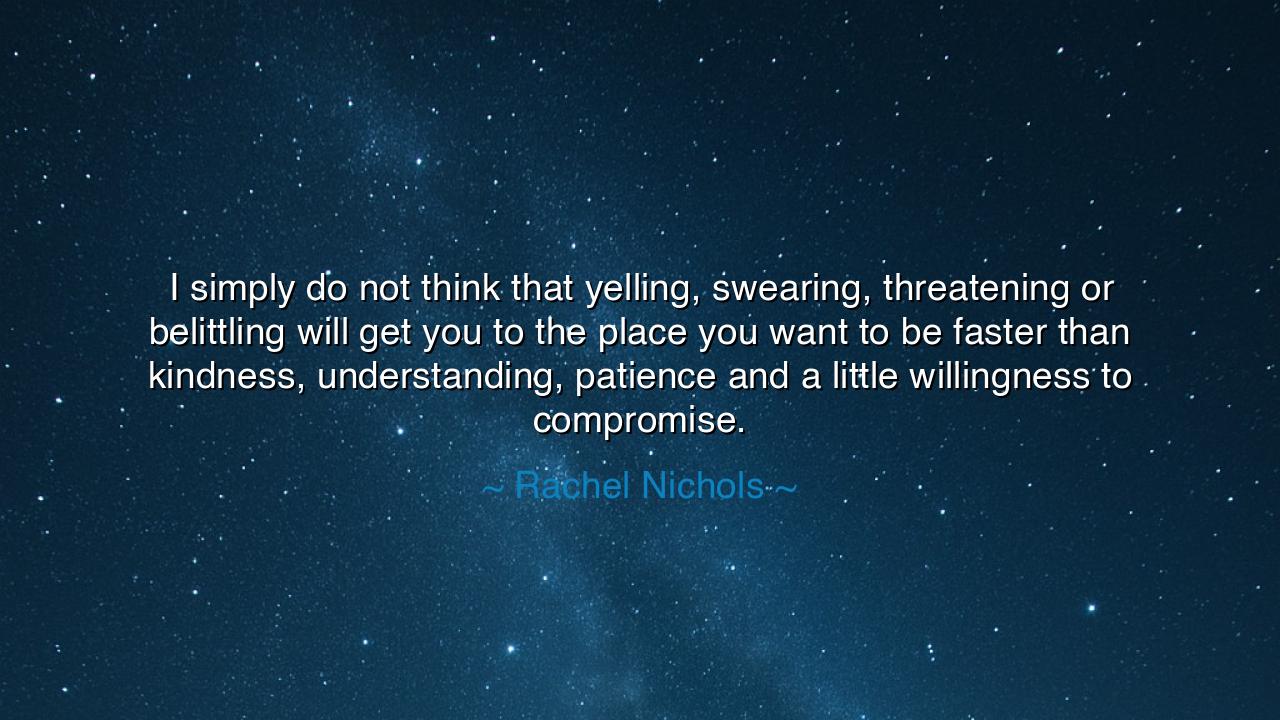
I simply do not think that yelling, swearing, threatening or
I simply do not think that yelling, swearing, threatening or belittling will get you to the place you want to be faster than kindness, understanding, patience and a little willingness to compromise.






Hear the wise words of Rachel Nichols, who declared: “I simply do not think that yelling, swearing, threatening or belittling will get you to the place you want to be faster than kindness, understanding, patience and a little willingness to compromise.” These words shine like a lantern in an age darkened by division and quick tempers. For she reminds us that the path to lasting victory is not paved with anger and cruelty, but with kindness, with understanding, with patience, and with the courage to bend when bending brings peace.
The origin of this saying lies in Nichols’ long career as a journalist and broadcaster, a profession where the clash of voices and the heat of competition are daily trials. She observed how often people resort to yelling, swearing, threatening, or belittling to gain the upper hand, believing that force and hostility will hasten results. Yet in her wisdom, she saw that such tactics rarely bring true success. They breed resentment, close doors, and sow seeds of bitterness. In contrast, when she practiced empathy, respect, and compromise, she found not only resolution but the trust and loyalty of others.
History itself testifies to this truth. Consider the story of Abraham Lincoln, who led a nation through civil war. Surrounded by anger, betrayal, and bloodshed, Lincoln could have ruled with iron fists and sharp words. Yet he often chose the softer path. He filled his cabinet with rivals and listened patiently to their counsel. He sought reconciliation rather than vengeance. His second inaugural address, spoken at the height of conflict, declared, “With malice toward none, with charity for all.” His greatness lay not in cruelty but in patience and understanding, and it was this spirit that bound the nation together after the war’s fires had cooled.
The same lesson is seen in the life of Mahatma Gandhi. Against the might of the British Empire, many thought only violence and rage could deliver freedom. Yet Gandhi insisted on nonviolence, on meeting oppression with dignity and peace. He compromised when he must, endured with patience, and led his people with kindness. The empire was shaken not by shouts or threats, but by the unbreakable moral force of peace. Gandhi’s triumph shows what Nichols affirms: the gentler virtues often carry us farther than the weapons of anger.
The heart of Nichols’ wisdom is this: anger may bring swift results, but they are shallow and short-lived. To belittle another may silence them, but it closes their heart forever. To threaten may win obedience, but it breeds fear that festers into hatred. Only kindness and compromise build foundations strong enough to last, for they create not only solutions but relationships, not only outcomes but peace. Where anger divides, kindness unites. Where threats destroy, patience heals.
The lesson for us is clear: in our daily conflicts—whether in families, in workplaces, in friendships, or in nations—choose the slower but surer road. When tempted to raise your voice, pause. When tempted to belittle, instead offer respect. When tempted to demand, instead offer compromise. This is not weakness, but strength, for it takes greater courage to master one’s anger than to unleash it. And in that mastery lies true victory.
So I say to you, children of tomorrow: let Nichols’ wisdom guide you. Cast away the weapons of rage and arm yourself instead with patience, kindness, understanding, and compromise. For though these tools may seem humble, they will carry you farther than cruelty ever could. They will build bridges where others build walls, open doors where others slam them shut, and bring you not only to your destination, but to a destination worth reaching. For the gentle virtues are not slow—they are eternal, and those who walk with them will never walk in vain.






AAdministratorAdministrator
Welcome, honored guests. Please leave a comment, we will respond soon